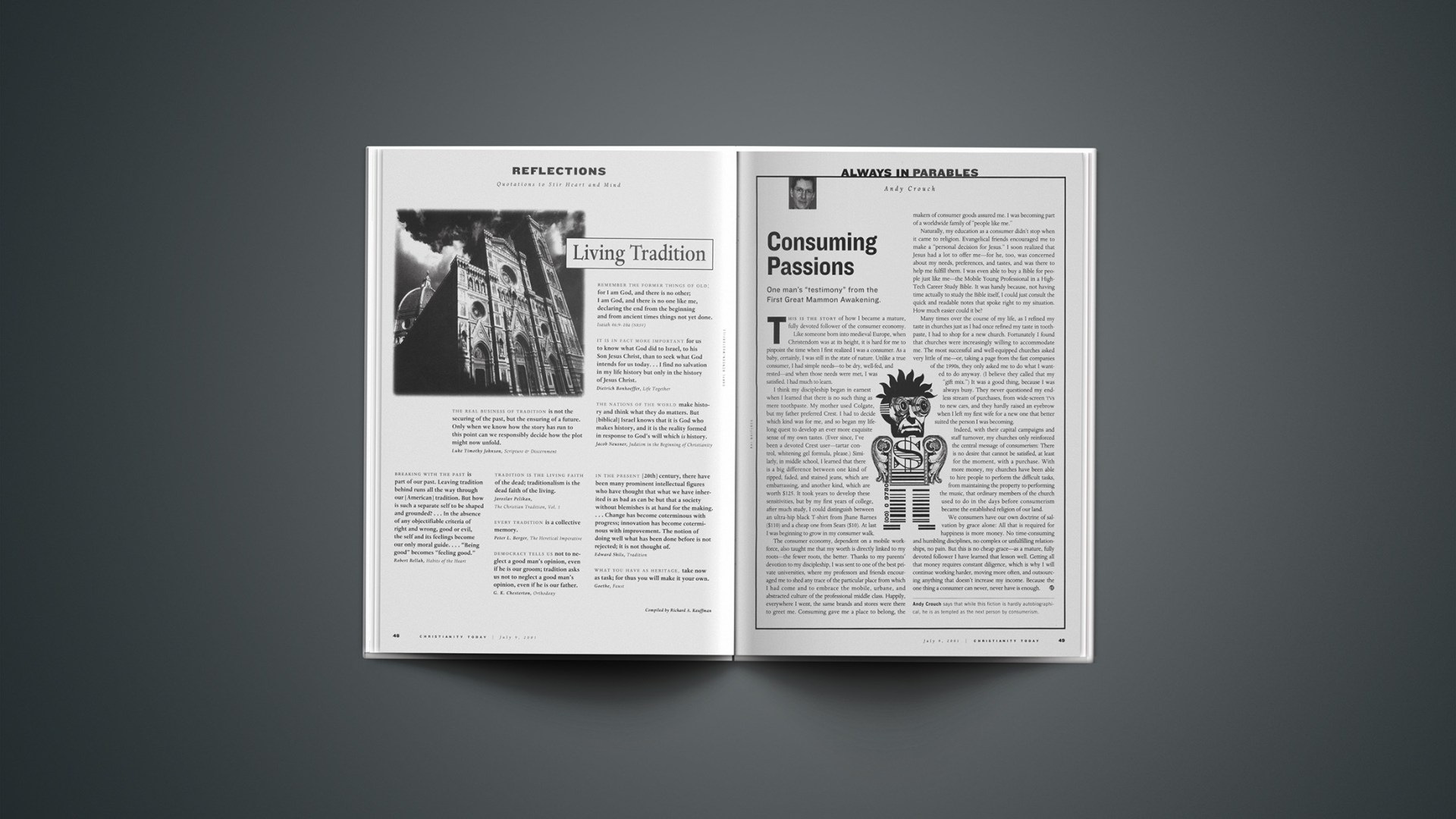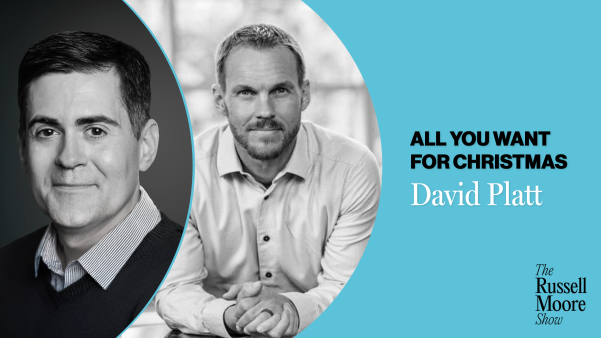This is the story of how I became a mature, fully devoted follower of the consumer economy.
Like someone born into medieval Europe, when Christendom was at its height, it is hard for me to pinpoint the time when I first realized I was a consumer. As a baby, certainly, I was still in the state of nature. Unlike a true consumer, I had simple needs—to be dry, well-fed, and rested—and when those needs were met, I was satisfied. I had much to learn.
I think my discipleship began in earnest when I learned that there is no such thing as mere toothpaste. My mother used Colgate, but my father preferred Crest. I had to decide which kind was for me, and so began my lifelong quest to develop an ever more exquisite sense of my own tastes. (Ever since, I’ve been a devoted Crest user—tartar control, whitening gel formula, please.) Similarly, in middle school, I learned that there is a big difference between one kind of ripped, faded, and stained jeans, which are embarrassing, and another kind, which are worth $125. It took years to develop these sensitivities, but by my first years of college, after much study, I could distinguish between an ultra-hip black T-shirt from Jhane Barnes ($110) and a cheap one from Sears ($10). At last I was beginning to grow in my consumer walk.
The consumer economy, dependent on a mobile workforce, also taught me that my worth is directly linked to my roots—the fewer roots, the better. Thanks to my parents’ devotion to my discipleship, I was sent to one of the best private universities, where my professors and friends encouraged me to shed any trace of the particular place from which I had come and to embrace the mobile, urbane, and abstracted culture of the professional middle class. Happily, everywhere I went, the same brands and stores were there to greet me. Consuming gave me a place to belong, the makers of consumer goods assured me. I was becoming part of a worldwide family of “people like me.”
Naturally, my education as a consumer didn’t stop when it came to religion. Evangelical friends encouraged me to make a “personal decision for Jesus.” I soon realized that Jesus had a lot to offer me—for he, too, was concerned about my needs, preferences, and tastes, and was there to help me fulfill them. I was even able to buy a Bible for people just like me—the Mobile Young Professional in a High-Tech Career Study Bible. It was handy because, not having time actually to study the Bible itself, I could just consult the quick and readable notes that spoke right to my situation. How much easier could it be?
Many times over the course of my life, as I refined my taste in churches just as I had once refined my taste in toothpaste, I had to shop for a new church. Fortunately I found that churches were increasingly willing to accommodate me. The most successful and well-equipped churches asked very little of me—or, taking a page from the fast companies of the 1990s, they only asked me to do what I wanted to do anyway. (I believe they called that my “gift mix.”) It was a good thing, because I was always busy. They never questioned my endless stream of purchases, from wide-screen TVs to new cars, and they hardly raised an eyebrow when I left my first wife for a new one that better suited the person I was becoming.
Indeed, with their capital campaigns and staff turnover, my churches only reinforced the central message of consumerism: There is no desire that cannot be satisfied, at least for the moment, with a purchase. With more money, my churches have been able to hire people to perform the difficult tasks, from maintaining the property to performing the music, that ordinary members of the church used to do in the days before consumerism became the established religion of our land.
We consumers have our own doctrine of salvation by grace alone: All that is required for happiness is more money. No time-consuming and humbling disciplines, no complex or unfulfilling relationships, no pain. But this is no cheap grace—as a mature, fully devoted follower I have learned that lesson well. Getting all that money requires constant diligence, which is why I will continue working harder, moving more often, and outsourcing anything that doesn’t increase my income. Because the one thing a consumer can never, never have is enough.
Andy Crouch says that while this fiction is hardly autobiographical, he is as tempted as the next person by consumerism.
Copyright © 2001 Christianity Today. Click for reprint information.
Related Elsewhere:
Previous Christianity Today articles on consumer economy include:
Why the Devil takes VISA | A Christian response to the triumph of consumerism. (Oct. 7, 1996)Christmas Unplugged | Why spending less and turning off TV should be part of the church’s mission to the world. (Dec. 9, 1996)The Bobo Future | “Bourgeois bohemians” wield inordinate power over how we think about consumerism, morality—and faith itself. (July 25, 2000)
Winning pieces in Christianity Today’s 1999 Faith and Consumerism Essay contest included:
Shopping for the Real Me | Why nothing ever quite fits right. (Nov. 15, 1999)Keeping Up with the Amish | We evangelicals have made a too-easy peace with the inroads of consumer culture. (Oct. 4, 1999)Trapped in the Cult of the Next Thing | If ever there was a cult that gave us stones when we asked for bread, this is it. (Sept. 6, 1999)
Earlier Andy Crouch columns for Christianity Today include:
Generation Misinformation | Forget the latest PowerPoint seminars on Generations X-Z.Dead Authors Society | We’re no longer interested in tasting death but only little morsels of cheer. (Mar. 28, 2001)Promises, Promises | Our technology works. But all idols do at first. (Feb. 21, 2001)A Testimony in Reverse | I have discovered how inconvenient it can be when God actually does speak. (Feb. 5, 2001)Crunching the Numbers | A modest proposal for measuring what really matters in church life. (Dec. 20, 2000)
Crouch is editor-in-chief of re:generation quarterly.
Many of Crouch’s other writings are available at his and his wife’s Web site.









